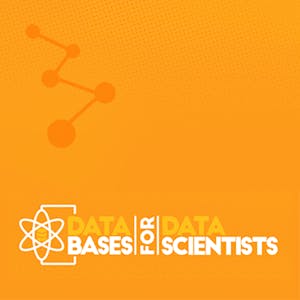Databases for Data Scientists
About this Specialization
Whether you are a beginning programmer with an interest in Data Science, a data scientist working closely with content experts, or a software developer seeking to learn about the database layer of the stack this specialization is for you! We focus on the relational database which is the most widely used type of database. Relational databases have dominated the database software marketplace for nearly four decades and form a core, foundational part of software development. In this specialization you will learn about database design, database software fundamentals, and how to use the Structured Query Language (SQL) to work with databases. The specialization, will conclude with an overview of future trends in databases, including non-relational databases (NoSQL) and Big Data. Upon completion of this specialization you will be well prepared to design and create efficient and effective relational databases, fill them with data, and work with them using SQL.Created by: University of Colorado Boulder

Related Online Courses
The course begins with an introduction to enterprise architecture and IT fundamentals, laying the groundwork for understanding how different technological components contribute to overall risk. You... more
Welcome to this Specialization focused on the principles of Microeconomics. This program is not merely about the study of money, but explores the functional roles of individual decision-makers,... more
This comprehensive course is designed for professionals and students seeking a deep understanding of the IoT security landscape. Learners should have a comprehensive understanding of IoT... more
In this course, you will learn about the foundations of machine learning (ML) and artificial intelligence (AI). You will explore the connections between AI, ML, deep learning, and the emerging... more
The second course of the Addressing Racial Health Inequity in Healthcare specialization you will journey through a survey of critical drivers of racial inequities in healthcare. These critical... more








